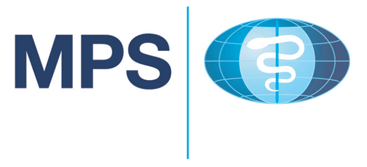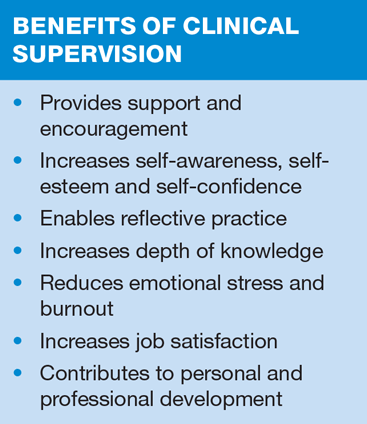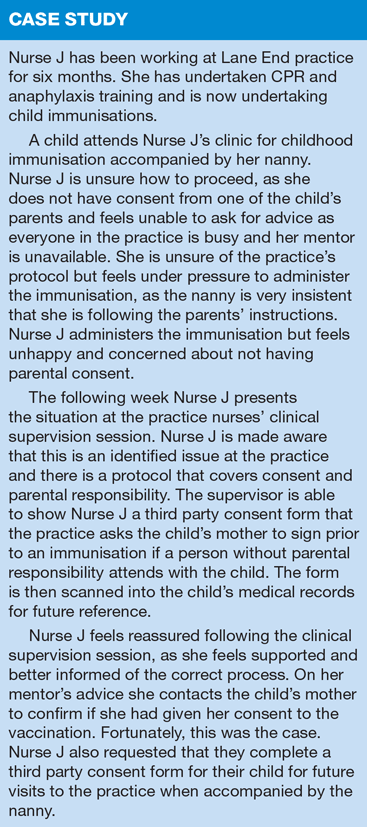Why clinical supervision matters
Diane Baylis
Diane Baylis
RN
Clinical risk manager, MPS
General practice is a fast changing environment, where nurses' roles are rapidly developing and changing. Diane Baylis, clinical risk manager at the Medical Protection Society, looks at the importance of clinical supervision in supporting nurses to undertake their role safely.
Clinical supervision has been around for many years; however it was in the 1990s that it was first advocated by professional bodies such as the Royal College of Nursing, primarily as a method of protecting standards. Clinical supervision is a strategy for professional development and a way of facilitating reflective practice and clinical decision making. The purpose of clinical supervision is to provide a safe and confidential environment for nurses to reflect on and discuss their work. Reflecting on their practice is a way for nurses continually to acquire new skills and knowledge and learn from experiences.
MODELS OF CLINICAL SUPERVISION
There are various models of clinical supervision:1
- One to one between mentor and mentee
- Group supervision
- Peer supervision (where practitioners can discuss work with each other)
- A combination of the above
The supervisor should have the skills, qualifications, knowledge and experience to undertake the role effectively. The supervisor should also be supported by having their own clinical supervision.1
A typical model used in general practice is group supervision for the practice nurse team led by the nurse team leader or senior nurse. The supervisor in turn receives one-to-one supervision from one of the GP partners.
Clinical supervision enables the nurse to:
- Reflect and review their practice
- Change or modify practice
- Discuss individual cases
- Review professional standards and protocols
- Keep up to date with new developments.
REVALIDATION
Reflective practice is the way in which professionals can learn from and be responsive to the changing environment and practice. Reflective practice allows the nurse to provide evidence of keeping up to date and their fitness to practise.
The Nursing and Midwifery Council is currently reviewing its systems on how to monitor nurses on the register and has announced its intention to introduce revalidation from December 2015.2 This will require all registered nurses to show how they are using practice feedback to improve standards of care. Nurses will also need to obtain confirmation from a third party on their continuing fitness to practise. Nurses who are participating in clinical supervision should find it beneficial, as this can be used as supportive evidence.
CARE QUALITY COMMISSION
Providing clinical supervision is one way the practice can demonstrate that they are compliant with regulation 23 (outcome 14) of the Care Quality Commission's 'Essential standards of quality and safety', which states that:
'People employed for the purposes of carrying out the regulated activity are appropriately supported in relation to their responsibility, to enable them to deliver care and treatment to people who use the services safely and to an appropriate standard.'3
POLICY
The practice should have a policy that describes the arrangements for clinical supervision, how it is implemented and its delivery.1 The content of a clinical supervision session should be confidential and content should be agreed by the supervisor and group. However, it must be clearly set out in the policy and in the supervisor contracts that if there are concerns about an individual staff member's competence or conduct, the supervisor may need to disclose information to the practice manager.
There should be a supervision contract so that all members are aware of the roles, responsibilities and boundaries of the group. Clear records must be kept and the supervisor must ensure that documentation of the session and any action plans are recorded.
Where clinical supervision is a requirement of employment, the employer owns the records. However, if clinical supervision is not included in the employment contract then the nurse owns the records and can keep them confidential.4
ORGANISATIONAL BARRIERS
The value of clinical supervision should be 'sold' to managers and staff in order for them to commit to setting aside their already stretched time. Time constraints are often the main barrier to any additional support or training. The nurses and managers need to have a sense of ownership in order for this to be successful.
SUMMARY
Healthcare organisations are increasingly becoming aware of the importance of risk management and the need for a safety culture. A culture of openness and learning is particularly important in the wake of public reports into care failings, notably the Francis report of the Mid Staffordshire NHS Trust public inquiry.5 Clinical supervision should be valued within the context of risk management and the culture of the organisation, which sets the standards, attitude and behaviours expected of staff. It should sit alongside good practice in recruitment and training to ensure that staff have the right skills and support to provide high quality, safe healthcare.
REFERENCES
1. Care Quality Commission. Supporting information and guidance: Effective clinical supervision. July 2013
2. Nursing and Midwifery Council. Background to revalidation
http://www.nmc-uk.org/Nurses-and-midwives/Revalidation/Background-to-revalidation/
3. Care Quality Commission. Essential standards of quality and safety.
http://www.cqc.org.uk/sites/default/files/media/documents/gac_-_dec_2011_update.pdf
4. Royal College of Nursing. Clinical supervision in the workplace.
http://www.rcn.org.uk/__data/assets/pdf_file/0007/78523/001549.pdf
5. The Mid Staffordshire NHS Foundation Trust Public Inquiry http://www.midstaffspublicinquiry.com
Related articles
View all Articles


